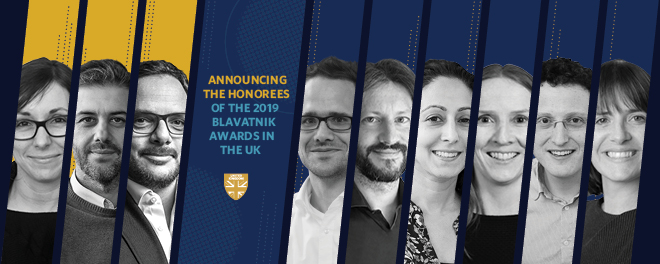
Largest Unrestricted Prize for Young Scientists Confers $480,000 in Awards to Nine Researchers
The Blavatnik Family Foundation and the New York Academy of Sciences today announced the Laureates and Finalists of the 2019 Blavatnik Awards for Young Scientists in the United Kingdom. One Laureate from each of the three categories of Life Sciences, Physical Sciences & Engineering, and Chemistry will receive an unrestricted prize of $100,000; additionally, two Finalists in every category will receive unrestricted prizes of $30,000 each. The Blavatnik Awards are the largest unrestricted cash prizes available exclusively to young scientists and engineers in the UK under the age of 42.
Now in their second year in the UK, the 2019 Blavatnik Awards for Young Scientists received 83 nominations from 43 academic and research institutions across England, Northern Ireland, Scotland, and Wales. A distinguished jury of leading senior scientists and engineers from throughout the UK selected the Laureates and Finalists.
“Recognizing and encouraging the brilliant talent of the UK’s best young scientists through the Blavatnik Awards is our honor,” said Sir Leonard Blavatnik, Founder and Chairman of Access Industries, head of the Blavatnik Family Foundation, and member of the President’s Council of the New York Academy of Sciences. "By supporting young scientists as they embark on their careers, we create a positive impact on the country’s future prosperity, accelerating scientific discovery and innovation that mankind can benefit from, and encouraging others to follow their path."
The 2019 Blavatnik Awards in the UK Laureates and Finalists come from universities and institutions across the United Kingdom. They are making headlines across medical and tech communities for discoveries and innovation in projects ranging from cell biology to neuron function analysis, to new molecular optical methodologies, advances in cyber security and radical breakthroughs in fundamental physics. Despite their young age, their research is already directly impacting human lives through technology and medicine and by helping to change our understanding of the world.
“Last year, our first year of administering the Blavatnik Awards for Young Scientists in the United Kingdom, we were touched by the reaction of leaders of the UK’s scientific community who agreed that there is no other prize in the UK that honors the achievements and, most especially, future promise of young scientists,” said Ellis Rubinstein, President and CEO of the New York Academy of Sciences and Chair of the Awards’ Scientific Advisory Council. "On behalf of our global Academy we have been thrilled to see so many institutions recognized through their fantastic honorees. And we are enormously proud to collaborate with the UK’s esteemed jury and Scientific Advisory Council members.”
The Blavatnik Awards in the UK sit alongside their global counterparts, the Blavatnik National Awards in the United States and the Blavatnik Awards in Israel, and all honor and support exceptional early-career scientists and engineers at lecturer level and above. The Blavatnik Awards for Young Scientists were established by the Blavatnik Family Foundation in the United States in 2007 and are administered by the New York Academy of Sciences. By the end of 2019, the Blavatnik Awards will have given prizes totaling US$8.4 million, honouring 300 outstanding young scientists and engineers from more than 44 countries representing 35 scientific and engineering disciplines.
The 2019 Blavatnik Awards Laureates and Finalists in the UK will be honored at a gala dinner and ceremony at the prestigious Victoria and Albert Museum in London on March 6, 2019. The following day the honorees will present their research in a public symposium entitled Cure, Create, Innovate: 9 Young Scientists Transforming Our World to be held at the Science Museum, London on March 7, 2019.
To follow the progress of the Blavatnik Awards, please visit the Awards’ website or follow us on Facebook and Twitter (@BlavatnikAwards). For media requests, please contact Kamala Murthy [kmurthy@nyas.org; +1-212-298-3740] or Giang Nguyen [giang.nguyen@hkstrategies.com; +44 20 7413 3153].
The 2019 Blavatnik Awards in the UK Laureates are:
LIFE SCIENCES
Prof. Ewa Paluch, University College London (UCL) and University of Cambridge
Prof. Paluch’s novel discoveries are at the forefront of cell biology: she has elucidated key biophysical mechanisms of cell division and migration, and has established physiological roles of cellular protrusions known as “blebs.” Previously thought to exist only in sick or dying cells, she established that these protrusions on the cell surface are common in healthy cells, and that blebs have important functions in cell movement and division. Her work will influence treatment for diseases such as cancer, where cell shape and migration are key to disease pathology, and she is leading the field towards a complete understanding of how the laws of physics affect the behavior of cells.
CHEMISTRY
Prof. Philipp Kukura, University of Oxford
Prof. Kukura is revolutionizing the way we visualize and study processes in nature. By detecting and measuring the scattering of visible light from single biomolecules, he can determine their mass and thereby analyze their structure and properties. Prof. Kukura hopes that this approach will be used widely to discover how biomolecules assemble, interact and thus function, as well as understand what goes wrong in disease, and how it can be addressed at a molecular level.
PHYSICAL SCIENCES & ENGINEERING
Prof. Konstantinos Nikolopoulos, University of Birmingham
Prof. Konstantinos Nikolopoulos led a 100-physicist subgroup in ATLAS, a large scientific collaboration at CERN, which made key contributions to the discovery of the Higgs boson. This discovery, jointly announced by the ATLAS and CMS collaborations at CERN, is regarded as one of the biggest breakthroughs in fundamental physics this century. This discovery completed the experimental verification of the Standard Model of particle physics, the mathematical theory through which we understand nature at the fundamental level, and resulted in the Nobel Prize in Physics being awarded to the physicists who predicted the Higgs boson decades ago. Prof. Nikolopoulos’ work has significantly improved our understanding of the Higgs boson and explored potential new physics beyond the Standard Model.
2019 Blavatnik Awards in the UK Finalists
The following scientists have been named as 2019 Blavatnik Awards in the UK Finalists:
LIFE SCIENCES
Prof. Timothy Behrens, University of Oxford; Honorary Principal Investigator, University College London (UCL)
Prof. Behrens’s work has uncovered mechanisms used by the human brain to represent our world, make decisions, and control our behavior. An understanding of how our neurons function in networks to control behavior is fundamental to our understanding of the brain, and has implications for neural network computing, artificial intelligence, and the treatment of mental and cognitive disorders.
Dr. Kathy Niakan, The Francis Crick Institute
Dr. Niakan is conducting pioneering research in human embryonic development, elucidating early cell-fate decisions in embryonic cells. To further these studies, she became the first person in the world to obtain regulatory approval to use genome-editing technologies for research in human embryos. Her research may provide new treatments for infertility and developmental disorders, and her work in scientific policy and advocacy is defining the ethical use of human embryos and stem cells in scientific research.
CHEMISTRY
Prof. Igor Larrosa, The University of Manchester
Prof. Larrosa is a world-leader in a sub-field of organic chemistry called carbon-hydrogen (C–H) bond activation, which is focused on finding ways to make these normally stable bonds reactive. Specifically, he has established new mechanistic insights into how C–H bonds can react with transition metals, and developed novel catalysts for the construction of molecules that previously were only accessible through multistep organic transformations.
Prof. Rachel O’Reilly, University of Birmingham
Prof. O’Reilly has pioneered the use of innovative chemical approaches in the fields of DNA nanotechnology, sequence-controlled synthesis of polymers, and precision synthesis to foster the development of novel materials. The novel molecules and structures produced from these methodologies have potential applications in healthcare, renewable energy, and sustainable chemistry.
PHYSICAL SCIENCES & ENGINEERING
Prof. Gustav Holzegel, Imperial College London
Prof. Holzegel develops rigorous mathematical proofs of physics questions related to Einstein’s general theory of relativity. He provided the first proof of a decades-old conjecture about the stability of black holes in the case of the simplest form of black holes in the universe, and has made significant progress towards completely proving this conjecture in the cases of more complicated types of black holes. The techniques he developed have also influenced studies on other open fundamental questions in theoretical physics and astrophysics.
Prof. Máire O’Neill, Queen’s University Belfast
Prof. O’Neill has proposed novel attack-resilient computer hardware platforms and chip designs that have found immediate applications. Her solutions are orders of magnitude faster than prior security implementations while also being cost-effective. Her achievements have already generated an enormous impact in society, which will continue to increase as cyberattacks costing the global economy hundreds of billions of dollars annually continue to grow at an unprecedented scale.
About the 2019 Blavatnik Awards UK Laureates
Prof. Ewa Paluch
2019 Blavatnik Awards in the UK Laureate in Life Sciences
Chair of Anatomy
University of Cambridge
Professor of Cell Biophysics
Medical Research Council Laboratory for Molecular Cell Biology, University College London (UCL) [Until April 2019]
BSc, Ecole Normale Supérieure de Lyon, France
DEA (MSc), Paris Diderot University, France
PhD, Institut Curie and Paris Diderot University, France
Group Leader, Max Planck Institute of Molecular Cell Biology and Genetics, Germany
 Prof. Paluch studies how cells move and change shape. Cells are not really the round blobs we may remember from biology class: they actually change shape all the time. This process is controlled by a meshwork of proteins just under the cell surface, and is governed by mechanical forces such as surface tension. Having the correct shape, or being able to move, divide, or change shape, is crucial for cells to function: problems regulating cell shape are part of many diseases, including cancer. Prof. Paluch and her team have made breakthrough discoveries in our understanding of cell shape regulation. For example, she has uncovered the precise steps involved in the formation of tiny cellular structures called “blebs.” Previously thought to exist only in sick or dying cells, she established that these protrusions on the cell surface are common in healthy cells, and that blebs have important functions in cell movement and division. More recently, her lab has started investigating cell shape during development, and how a cell’s shape can influence what kind of cell it will become. Together, Prof. Paluch’s groundbreaking discoveries provide insight into the roles of cell shape and movement in development and disease.
Prof. Paluch studies how cells move and change shape. Cells are not really the round blobs we may remember from biology class: they actually change shape all the time. This process is controlled by a meshwork of proteins just under the cell surface, and is governed by mechanical forces such as surface tension. Having the correct shape, or being able to move, divide, or change shape, is crucial for cells to function: problems regulating cell shape are part of many diseases, including cancer. Prof. Paluch and her team have made breakthrough discoveries in our understanding of cell shape regulation. For example, she has uncovered the precise steps involved in the formation of tiny cellular structures called “blebs.” Previously thought to exist only in sick or dying cells, she established that these protrusions on the cell surface are common in healthy cells, and that blebs have important functions in cell movement and division. More recently, her lab has started investigating cell shape during development, and how a cell’s shape can influence what kind of cell it will become. Together, Prof. Paluch’s groundbreaking discoveries provide insight into the roles of cell shape and movement in development and disease.
Prof. Philipp Kukura
2019 Blavatnik Awards in the UK Laureate in Chemistry
Professor of Chemistry
University of Oxford
MChem, University of Oxford
PhD, Chemistry, University of California, Berkeley, USA
Postdoc, ETH Zurich, Switzerland

Prof. Kukura is a physical chemist who is developing cutting-edge optical methodologies for the visualization and analysis of molecules such as proteins that exist within the body. To accomplish this task, he takes advantage of the scattering of visible light, which is the universal process through which we see the world around us. On the macro-scale, this scattered light provides information on the size and shape of an object. What Prof. Kukura has shown is that when driven to the extreme by detecting this light scattering from tiny objects in a microscope, this approach not only works with single biomolecules, but can also be used to measure their molecular mass, introducing a new way of weighing objects. The macroscopic equivalent would be to know the mass of a loaf of bread to within a few grams just by looking at it. Prof. Kukura hopes that this approach will be used widely to discover how biomolecules assemble, interact and thus function, as well as understand what goes wrong in disease, and how it can be addressed at a molecular level.
Prof. Konstantinos Nikolopoulos
2019 Blavatnik Awards in the UK Laureate in Physical Sciences & Engineering
Professor of Physics
University of Birmingham
Ptychion (BS) and MSc, University of Athens, Greece
PhD, University of Athens, Greece
Research Fellow, Brookhaven National Laboratory, USA
 Prof. Konstantinos Nikolopoulos played a pivotal role in the discovery of the Higgs boson, one of the biggest breakthroughs in fundamental physics this century. The Higgs boson is a unique elementary particle that is directly related to the mechanism giving other elementary particles their mass. It was first postulated in 1964, and was discovered in 2012 by the ATLAS and CMS collaborations at the European Organization for Nuclear Research (CERN) with the involvement of thousands of scientists and engineers globally. Prof. Nikolopoulos began participating in the ATLAS collaboration as an undergraduate, and by 2010 he was appointed as the convener of a 100-physicist subgroup working on one of the two discovery channels of the Higgs boson, only months after completing his PhD. He led this subgroup to achieve the discovery of the Higgs boson, which was announced in July 2012 by CERN and resulted in the Nobel Prize in Physics being awarded in 2013 to physicists who decades ago predicted its existence. This discovery completed the experimental verification of the Standard Model of particle physics, the mathematical theory underpinning our understanding of the universe. Subsequently, Prof. Nikolopoulos had a leading role on the project to precisely measure the properties of the Higgs boson, and pioneered new approaches to explore new physics beyond the Standard Model.
Prof. Konstantinos Nikolopoulos played a pivotal role in the discovery of the Higgs boson, one of the biggest breakthroughs in fundamental physics this century. The Higgs boson is a unique elementary particle that is directly related to the mechanism giving other elementary particles their mass. It was first postulated in 1964, and was discovered in 2012 by the ATLAS and CMS collaborations at the European Organization for Nuclear Research (CERN) with the involvement of thousands of scientists and engineers globally. Prof. Nikolopoulos began participating in the ATLAS collaboration as an undergraduate, and by 2010 he was appointed as the convener of a 100-physicist subgroup working on one of the two discovery channels of the Higgs boson, only months after completing his PhD. He led this subgroup to achieve the discovery of the Higgs boson, which was announced in July 2012 by CERN and resulted in the Nobel Prize in Physics being awarded in 2013 to physicists who decades ago predicted its existence. This discovery completed the experimental verification of the Standard Model of particle physics, the mathematical theory underpinning our understanding of the universe. Subsequently, Prof. Nikolopoulos had a leading role on the project to precisely measure the properties of the Higgs boson, and pioneered new approaches to explore new physics beyond the Standard Model.
###
About the Blavatnik Family Foundation
The Blavatnik Family Foundation is an active supporter of world-renowned educational, scientific, cultural and charitable institutions in the United States, the United Kingdom, Israel and throughout the world. The Foundation is headed by Sir Leonard Blavatnik, a global industrialist and philanthropist and the founder and chairman of Access Industries, a privately held US industrial group with global strategic interests in natural resources and chemicals, media and telecommunications, real estate, and venture capital. See more at www.blavatnikfoundation.org.
About the New York Academy of Sciences
The New York Academy of Sciences is an independent, not-for-profit organization that since 1817 has been committed to advancing science, technology, and society worldwide. With more than 20,000 members in 100 countries around the world, the Academy is creating a global community of science for the benefit of humanity. The Academy's core mission is to advance scientific knowledge, positively impact the major global challenges of society with science-based solutions, and increase the number of scientifically informed individuals in society at large. Please visit us online at www.nyas.org.
To follow the progress of the Blavatnik Awards, please visit www.blavatnikawards.org or follow us on Facebook and Twitter (@BlavatnikAwards).
###